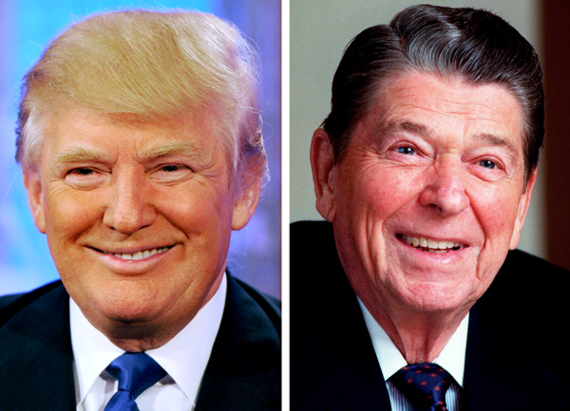
"I'm pro-life, and I was originally pro-choice. I will say this, that as a developer and as a businessman I'm not sure I was ever even asked the question, 'Are you pro-life, pro-choice?' . . . I have evolved. I talk about evolving all the time. And by the way, you know who else evolved? Ronald Reagan evolved. Because Ronald Reagan signed one of the toughest abortion laws in favor of abortion in California that had been signed in many, many years. . . . He wasn't very conservative [passing the law as governor], but he was a pretty conservative president."
— Donald Trump, CNN town hall, March 29, 2016
![]()
There is growing attention on Donald Trump's rhetoric on gender and women, which his critics view as misogynistic or often reduced to superficial comments about appearances (recent example: Trump's comments about Ted Cruz's wife). Ahead of the April 5 Wisconsin primary, Trump is facing more questions about his policy views on gender and women's issues -- particularly, his views on abortion.
Trump often compares his self-described evolution from being a Democrat to Republican to Ronald Reagan, who was once a Democrat before becoming the Republican icon. And now, he suggests that his evolution from supporting abortion rights to vocally opposing it is like Reagan's, who once passed a law in favor of women's access to abortion.
Reagan did sign a law in 1967 that liberalized abortions -- six years before the Supreme Court's decision on Roe v. Wade. But this was long before abortion was a national social policy matter, before there were such terms like "pro-choice" and "pro-life." The circumstances were a lot different then. Reagan did evolve on his abortion views, but it was less stark of a transition than Trump's. It's time for a history lesson for the Republican front-runner.
![]()
In 1999, Trump publicly said he was a supporter of abortion rights as a matter of women's choice. In an interview on NBC's "Meet the Press," Trump was asked whether he would ban abortions, or at least "partial-birth" abortions. He said he would not, and that he is "pro-choice in every respect." (Note: This shows he was indeed asked the question, despite his statement to CNN that "as a businessman I'm not sure I was ever even asked the question.")
"I'm very pro-choice," Trump told NBC's "Meet the Press." "I hate the concept of abortion. . . . But still, I just believe in choice."
But now on the presidential campaign trail in 2016, Trump is a vocal opponent of women's rights to abortion. Trump explains that he hadn't given it much thought from a policy perspective when he was a businessman. And now that he is a presidential candidate, he says he is decidedly anti-abortion.
How similar is that to Ronald Reagan's evolution?
In June 1967, six months after becoming the Republican governor of California, Reagan signed a bill into law that he later would call "my worst decision as governor." It was the California Therapeutic Abortion Act, which aimed to make California the third state in the nation to liberalize abortion laws. Having an abortion was a crime in every state, and doctors were performing thousands of illegal abortions in the state every year (and some women were going to Mexico to get illegal abortions). There was no "pro-choice" or "pro-life" lobbying at the time. The battle lines were drawn along religious lines, according to Reagan biographer and former Washington Post reporter Lou Cannon. In 1967, the majority of Californians, including 67 percent of Catholics, had supported liberalizing abortion laws. (California at the time permitted abortions only to save the life of the mother.)
Catholic Democrats generally were anti-abortion, but liberal Democrats pushed for a permissive version of a law to provide women broad access to abortions. Conservatives who were not Catholics, generally Protestants, supported the proposed law, believing the government should stay out of "the boardroom and the bedroom," Cannon wrote in "Governor Reagan: His Rise to Power."
Yet Republican lawmakers wanted to stop a broad-ranging version of the bill from progressing, and pushed for a less permissive version. Some Republicans also believed that if Reagan didn't sign some sort of abortion bill into law in 1967, the issue would come back every year -- or that the legislature would override his veto.
Reagan was torn. He had not given abortion much thought and had no strong opinion prior to taking office -- it wasn't a leading social issue at the time -- but he was faced with a decision that could set the tone for the rest of the country. Not helping with Reagan's indecision, his staff were split along religious lines on the issue and had no clear consensus on which direction the governor should go. For instance, his legal affairs secretary, Edwin Meese, urged Reagan to sign the bill.
"I did more studying and soul searching on this matter than on anything that was to face me as governor," Reagan later said in a radio address detailing his struggle contemplating the law.
"My answer as to what kind of abortion bill I could sign was one that recognized an abortion is the taking of a human life. . . . Therefore, an abortion is justified when done in self-defense. My belief is that a woman has the right to protect her own life and health against even her own unborn child. I believe also that just as she has the right to defend herself against rape, she should not be made to bear a child resulting from the violation of her person and therefore abortion is an act of self-defense.
Reagan reluctantly signed a compromise bill, and said the measure did not fully satisfy him. California became the third and largest state to legalize abortions in cases of rape, incest or when the pregnancy "would gravely impair physical or mental health" of the mother.
Then, abortions increased exponentially, as doctors took a loose interpretation of the "mental health" provision. Annual abortions spiked, and Reagan regretted his decision once he saw how the law was being implemented. Even Democrats were surprised at how doctors interpreted this "mental health" exception.
"It's the only major thing that he ever did as governor or president, that I'm aware of or that I can recall, that he ever said he did the wrong thing," Cannon recalled to The Fact Checker. Reagan later ran for president on an antiabortion platform.
As readers can see, it clearly was a different point in history. By the time the Supreme Court considered Roe v. Wade in 1973, legalizing abortion nationally, almost half the states had followed the decisions of states like California to open up abortion laws with exceptions. Back then, even supporters of abortion rights were skeptical of Roe v. Wade decision or opposed it. Supreme Court Justice Ruth Bader Ginsburg, a liberal icon, has even criticized it for empowering the anti-abortion movement, and cutting off a gradual move among states to legalize abortion along with courts and state legislatures.
![]()
In a rare instance, the Republican front-runner is not glaringly incorrect. He accurately cites a controversial decision by Reagan that allowed abortion in California in cases of rape, incest and physical and mental health of the mother -- one of the first states to do so. Reagan was torn on the decision; he believed the fetus was a "living human being with human rights," but was presented with evidence of thousands of women in his state already seeking abortions illegally. Reagan's view of allowing abortions in cases of rape, incest or life of the mother is actually consistent with what many people with "pro-life" views believe.
Reagan signing the law was not necessarily a reflection of his support for women's right to choice, as it was long before the terms "pro-choice" and "pro-life" existed. Rather, his decision resulted from a confluence of a grass-roots movement among women and doctors, political maneuvering from legislators in the State Assembly, and his own lack of direction on exactly how he stood on the matter. Looking back now, it is clear Reagan had "pro-life" tendencies, as we now use the term.
We take issue with the historical comparison Trump makes. His evolution is not analogous with Reagan's, when considering the historical context. Trump said he was "very pro-choice," and now he identifies as "pro-life." But he is identifying with such labels after the battle lines in the abortion debate long had been drawn. In contrast, Reagan's evolution took place when he deliberated whether to legalize abortions for specific circumstances that he believed was appropriate: rape, incest and physical and mental health of the mother. When the last provision was interpreted far beyond he had intended, he regretted his decision and became even more strongly anti-abortion.
Politicians obviously have the right to change their views on key issues. But Trump's suggestion that he has "evolved" just like Reagan suggests he does not really know the history of Reagan's decision-making on the law. Trump should drop the comparison; it's a gratuitous one that lacks historical context, and not analogous to his own evolution.
Comment by clicking here.
An award-winning journalism career spanning nearly three decades, Glenn Kessler has covered foreign policy, economic policy, the White House, Congress, politics, airline safety and Wall Street. He was The Washington Post's chief State Department reporter for nine years, traveling around the world with three different Secretaries of State. Before that, he covered tax and budget policy for The Washington Post and also served as the newspaper's national business editor. Kessler has long specialized in digging beyond the conventional wisdom, such as when he earned a "laurel" from the Columbia Journalism Review



 Contact The Editor
Contact The Editor
 Articles By This Author
Articles By This Author